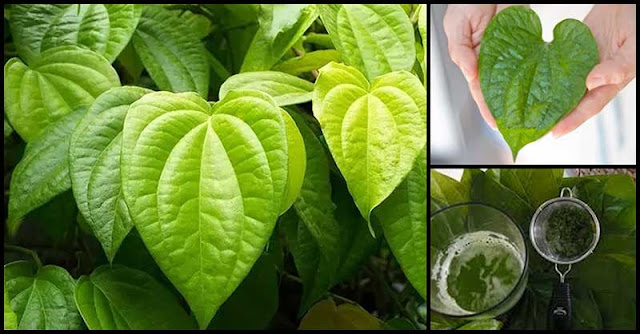Betel leaf (Piper betle) is a heart-shaped deep green color leaf which has a strong, pungent, and aromatic flavor and is widely use as a mouth freshener. Since ancient times in India, betel leaves have been used in prayer and religious rituals since it has been considered auspicious. Indians usually chew betel leaves after lunch or dinner.
Nutritional Value of Betel Leaf
This aromatic creeper is loaded with vitamins and nutrients such as vitamin C, thiamine, riboflavin, niacin, calcium, and carotene.
100 grams of betel leaf contains the following:
1.9-2.9 micrograms of vitamin A
1.3 micrograms of iodine
13 micrograms of vitamin B-1,
1.9-30 micrograms of vitamin B-2
0.63-0.89 micrograms of nicotinic acid
1.1-4.6 micrograms of potassium
Betel leaf is high in moisture content since it is approximately 85 to 90 percent water. It also has a low-calorie count, low-fat content and a moderate amount of protein. About 100 grams of betel leaves contain just 44 calories, 0.4-1% fat, and 3-3.5% protein.
Also known as “paan leaves”, here are some of the medicinal properties of betel leaves.
Healthy Digestion
Betel leaf can help accelerate good digestion due to its gastro-protective, carminative, and anti-flatulent properties. It stimulates the release of saliva during digestion, as various enzymes in breaks down the food thereby making it easy to digest.
Create an oil out of betel leaf and massage in on your stomach. Doing this will help in the secretion of gastric juices and digestive acids. You can also boil betel leaves with peppermint leaves in water. Strain and drink the water once a day. Also, you can have gastro-protective properties by just chewing betel leaf.
Anti-malarial Agent
Since ancient times, betel leaves were used as an anti-malarial remedy. The leaves have promoting compounds known as terpenes – which has anti-malarial properties. Moreover, its flavonoids have a significant anti-parasitic activity that fights off different parasite strains of malaria.
Anti-asthmatic Agent
The antioxidant and anti-inflammatory properties of betel leaf, as well as its oil and various polyphenols, are the ones that help in the treatment and management of asthma. According to research, it can be the anti-histaminic activity of betel leaf that causes a decrease in bronchial asthma cases.
Betel Leaf For Constipation
Betel leaf has various antioxidant properties that help in managing the pH level of the stomach. It is also a rich source of vitamin C which help the body fight off and get rid of free radicals that cause chronic diseases.
To reap this benefit, all you need to do is to soak the betel leaf in water and store overnight. In the morning, drink the water on an empty stomach or simply chew the soaked betel leaf regularly.
Promotes Liver Function
Tannin, a compound which is found in betel leaf, has a role in promoting liver function and can also help in preventing cellular damage that causes cancer.
Betel Leaf Reduce Gastric Pain
Due to its ability to normalize the unbalanced pH level of the stomach, betel leaf can provide a quick relief from acidity, gastric pain, and pain aroused due to the bloating problem. This natural medicine is also efficient at improving Gastroesophageal Reflux Disease or GERD. Just make it sure that you maintain a gap of at least 30 minutes between consumption of betel and your meal.
Lowers High Cholesterol Levels
Betel leaf can help lower high levels of cholesterol, triglycerides, low-density lipoprotein (LDL)cholesterol, and very low-density lipoprotein (VLDL) cholesterol. This is mainly due to its eugenol content which is a natural antioxidant that neutralizes free radicals.
Treats Muscular Problems
You can treat muscular problems by just grinding betel leaves and them mixing them with an essential oil such as olive oil or coconut oil and then, apply on the skin. Additionally, you can also massage the affected area with betel leaves oil.









